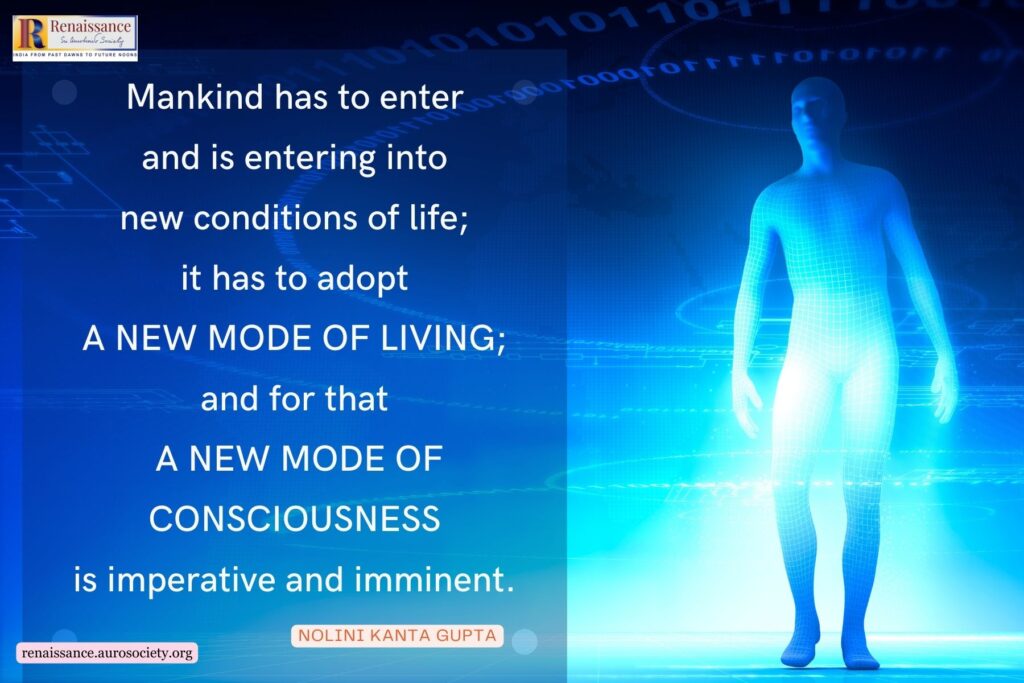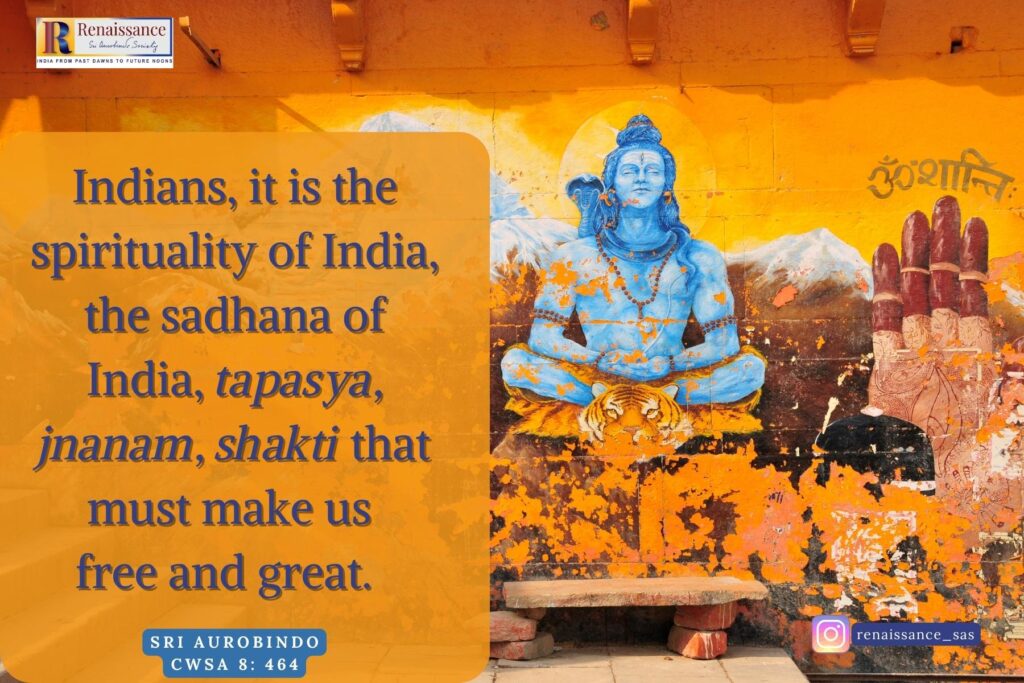Author: Agali Venkappa Sastri

Continued from Part 8
TOWARDS EMANCIPATION
The Nationalist Party inspired by the religion of patriotism envisaged absolute Swaraj, – self-government as it existed in the United Kingdom, not as it existed in the colonies, which was the scope of the Congress’ demand enunciated by Dadabhai Naoroji. The first formulation of the Swaraj ideal was more a matter of finding a Sanskrit equivalent for a Western political vocable than rediscovering the spirit of the India of long ago and recharging it with a new potency. But the spirit emerges.
The policy of Passive Resistance was evolved as the necessary complement of self-help. As Sri Aurobindo wrote, self-development and a scheme of Passive Resistance were “supplementary and necessary to each other.” (CWSA, Vol. 6, p. 283)
Passive Resistance was a courageous doctrine of the soul expressing the determination of the nation at once to resist bureaucratic high-handedness and to depend on themselves for the realisation of freedom, preparedness to suffer for one’s convictions, this again attesting to the high value of what we contend for.
No More Mendicancy
The nation had indeed travelled a long way from moderation, compromise and conciliation. There was a tendency to swing to the opposite extreme of intransigence and violent display of anti-British feeling.
The outburst of anti-European feeling which followed on the Partition gave the required opportunity. Anger, vindictiveness and antipathy are not in themselves laudable feelings, but God uses them for his purposes. They drove listlessness and apathy away and replaced these by energy and a powerful emotion; and that energy and emotion were seized upon by the national self and turned to the uses of the future.
~ CWSA, Vol. 8, p. 63
A further explanation is offered by Sri Aurobindo:
When tamas, inertia, torpor, has benumbed a nation, the strongest forms of rajas are necessary to break the spell; there is no form of rajas so strong as hatred. Through rajas we rise to sattwa, and for the Indian temperament the transition does not take long.
~ CWSA, Vol. 7, p. 1120
The new born energy manifested itself in stray anarchical developments. A few people not merely repudiated with scorn all that savoured of British origins but also indulged in violence. Rajas tended to Sattwa, however.
Nationalism had found its law of being. It had clearly seen and unmistakably stated its ideal. It had ceased to look for help from the constituted powers and developed an ethic of self-reliance. Mendicancy was finally abandoned. A change in method and spirit both were noticeable. Not infructuous agitation but constructive regenerative activities, withdrawal of consent and cooperation and the organization of a programme of non-cooperation became the nation’s motto.
Socially the movement widened itself by enlisting the youth, the masses and the women. The response of these sections of society indicated the extent to which nationalism had succeeded in its idealistic appeal to the heart and the imagination.
The Nationalist movement in its new fervour assumed full form under the leadership of Lokmanya Balgangadhar Tilak, whom Sri Aurobindo referred to as “the foremost exponent and head of a thoroughgoing nationalism.” (CWSA, Vol. 1, 646)
The greatness of the Lokmanya consists in Indianising the political movement, in giving it a virile turn in rejecting Western estimates, in the application of a subtle intellect to the various aspects of political regeneration.
It was spiritual not in the deepest sense of the word, but in the gospel of self-reliance it inculcated, in the conception of Swaraj as a birthright and not a concession or gift, the definite acceptance of swadharma in politics. It assumed a popular expression in the inauguration of major mass festivals dedicated to Ganesha and Shivaji, and the wide diffusion of the new ideology through the vernacular press. The mass mind began to be leavened.
Moral Nationalism: The Limits of Ethics
With the advent of Gandhiji whose name is inseparably associated with the fruition of our protracted struggle for freedom, the nation entered upon a phase of ethical discipline. Non-cooperation was now a moral campaign directed against a political system.
Yet reviewing the whole problem in the larger context of life, we must ask the question – what is the main leverage of life? What is the supreme dynamis? What is its metaphysical validity? What is its practical utility? Can the ethical be regarded as an absolute or all-sufficing or all-comprehensive formula of life? A consideration of these questions by competent men and women will mean the revision of the foundations of life as constituted at present.
Realization of the Highest Truth and its actualisation in the circumstances and conditions of life – this has been the single problem of humanity through the ages. How to secure power, how to forge the instruments that will avail to make life divine, have been humanity’s preoccupation.
Sri Aurobindo wrote in his letter to Deshabandhu Chitta Ranjan Das in November 1922:
I have been confirmed in a perception which I had always less clearly and dynamically then but which has now become more and more evident to me that the true basis of work and life is the spiritual, that is to say, a new consciousness to be developed only by Yoga; I see more and more manifestly, that man can never get out of the futile circle the race is always treading until he has raised himself on to the new foundation.
I believe also that it is the mission of India to make this great victory for the world. But what precisely was the nature of the dynamic power of this great consciousness? What was the condition of its effective truth? How could it be brought down, mobilised, organized, turned upon life? How could our present instruments, intellect, mind, life, body be made true and perfect channels for this great transformation?
~ CWSA, Vol. 36, pp. 260-261
This was the problem Sri Aurobindo had set to work out in his own experience.
The Need for Supra-Ethical
The spiritual is other than the moral; it is supra-ethical. Rising above the ethical does not mean allowing our lower nature a free rein. The moral like the mental is an intermediary phase. It has a preparatory value. None but the jivanmuktas may transgress the moral law with impunity. But we have to realize its essential nature and limitations as well.
While, in the first instance, we – every one of us – have to achieve sattwa, moral high-mindedness, at the same time we have to recognise that it is but a part of the process, is efficacious up to a point, and beyond that, for a higher operation, we have to acquire a spiritual transcendence – a transcendence that has its portion, its essence, in the universal, in the individual as well, and ensures to us a totality, an integrality of action.
The Gandhi movement was essentially one of riddance. It achieved political freedom, a preliminary purificatory process.
While it purged the political atmosphere by fixing a high ideal, by insisting on clean methods, while it ethically drew together the elements for a struggle, ‘a fight to the finish,’ and imposed on them a technique of resistance best fitted under the circumstances of a disarmed people dominated by armed might, it could not ideally purify the nation because a higher than moral sanction is needed for the purpose.
The mass of the nation being what it was [or still is], Gandhism, by force of individual example, could only loosely organize it for a campaign of independence. In the process it suffered dilution, attrition, distortion, so that Gandhism at its rare height remains a solitary individual exemplification.
This initial purificatory movement, while availing to save the people from the British and forcefully changing the current back from the channels of decadent European nationalism, helped the waters to gather for a resumed flow in its ancient bed. Spiritualising politics by direct political action, by fixing allegiance to the country and the nation as the sole godheads, will only result in a travesty of spirituality, though it brings its own incidental good.
Real purification can be effected only by other and more radical means, a spiritual conversion of our nature, and not mere moral medication.
The turbid mass may respond outwardly by desisting from acts of open violence – not always to be depended on, however, – but it neither understands the technique nor yet the spirit that saves it. It comes to harbour unregenerate passion. The higher the ethic, the more severe the strain upon common human stuff, and the greater the distortion and sanctimonious humbug that will prevail.
Externally holding back from violence, the mass mind seethes internally, and in a crisis, borne down by the weight of its own unchastened lusts and unsatisfied hungers and ravenous instincts, breaks loose into anarchic acts of arson and murder, such as those that painted red the dawn of Indian freedom and also those have ensanguined the record of history elsewhere.
Gandhism marks the limit of the moral example.
It shows the furthest that can be done in the direction of ethical discipline, ethical influence and ethical endeavour. If ethical means could suffice, Gandhism should.
The restraint, the purity, the candour, the very human ties of sympathy by which it sought to bind the people together, the rigour and suffering it cheerfully bore as part of the process, the practical success it achieved, stamped Gandhism with a grandeur of its own. It was a tribute to the individual, a tribute to the potency of principles and ideals conceived on the mental, the moral plane.
Attested in its high purity in the individual, when the austere ethic is applied to the mass, it will find itself in the grip of giant passions which it (the mass) may hide but cannot subjugate.
Continued in Part 10
Cover image – Bhārata Mahima, by Ritam Upadhyay



